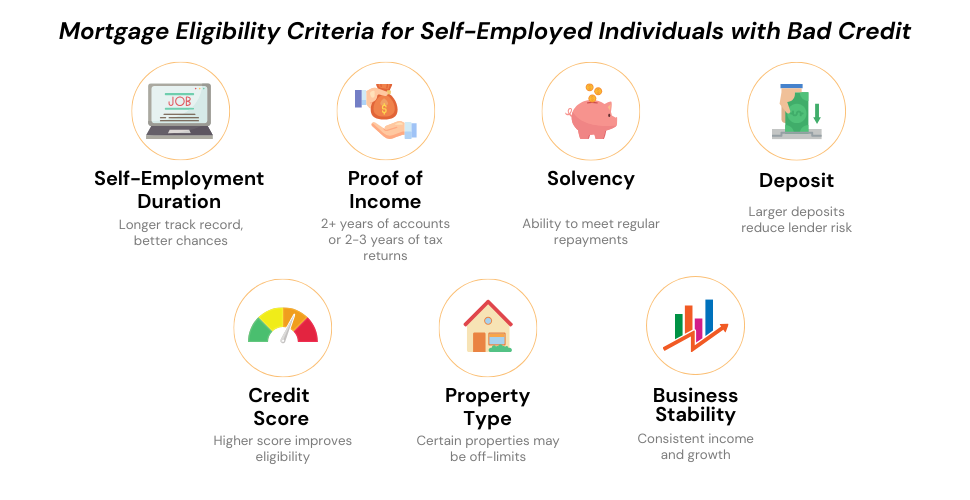- Is a Bad Credit Mortgage Possible for the Self-Employed?
- Avoid Direct Lending: Hereâs Why
- Mortgage Eligibility Criteria for Self-Employed Individuals with Bad Credit
- How Your Bad Credit Is Evaluated
- How To Mitigate Risk to Secure a Mortgage?
- How Much Can You Borrow as a Self-Employed with Bad Credit?
- Can a Joint Mortgage Help in My Application?
- How Can I Get a Mortgage with Bad Credit as a Self-Employed?
- Key Takeaways
- The Bottom Line
How To Get Mortgages for Self-Employed With Bad Credit?

Being self-employed can feel like juggling too much at once—finding work, sorting invoices, and keeping track of expenses.
On top of that, getting a mortgage might feel like an impossible task, especially if your credit score isn’t great.
You might be asking yourself, “Where do I even start?” or “Is this something I can actually do?” It’s easy to feel stuck, but don’t worry—that’s what this guide is here for.
We’ll show you how you can get a mortgage as a self-employed person, even with bad credit. Plus, you’ll get practical tips to improve your chances of approval.
Let’s get started!
Is a Bad Credit Mortgage Possible for the Self-Employed?
Yes, it’s possible to get a mortgage if you’re self-employed and have bad credit. But let’s not pretend it’s easy—it can be challenging.
You might face:
- Higher Interest Rates – Lenders consider you a higher risk, which means they’re likely to charge more for borrowing.
- Larger Deposit Requirements – You may need a bigger deposit to secure the deal, sometimes as much as 20-30%.
- Fewer Lender Options – Many mainstream lenders might decline your application, leaving you with a smaller pool of specialist lenders to choose from.
- Stricter Affordability Checks – Lenders will scrutinise your income and expenses more thoroughly to ensure you can manage repayments.
- Limited Mortgage Terms – You might be offered shorter mortgage terms, which could increase your monthly repayments.
However, some lenders specialise in non-standard applications, including self-employed individuals with bad credit. They usually assess factors like:
- How long you’ve been self-employed.
- What caused your bad credit and how severe it is.
- How much deposit you can provide (a bigger deposit helps).
- Whether you meet their affordability rules based on your income and outgoings.
Working with a good mortgage broker can make all the difference—they’ll help you find the right lenders and improve your chances of success.
That said, even with professional guidance, there’s no guarantee you’ll secure a mortgage.
Your eligibility will depend on factors such as your finances, the lender’s criteria, and your ability to meet their requirements.
Avoid Direct Lending: Here’s Why
When you’re seeking a mortgage as a self-employed individual with bad credit, you might be tempted to contact lenders directly. It seems like the most straightforward path, doesn’t it?
But, this approach can carry risks and negative consequences.
When you apply to several lenders directly, each one will conduct a ‘hard’ credit check. This type of check can further lower your credit score, making it even more difficult to secure a mortgage.
Moreover, without expert guidance, you could find yourself overwhelmed by the myriad of complex mortgage options, potentially missing out on a deal better suited to your circumstances.
Mortgage Eligibility Criteria for Self-Employed Individuals with Bad Credit
Let’s delve into the criteria lenders typically use when assessing a mortgage application from a self-employed person with bad credit. Understanding these criteria can make the application process less confusing:
Self-Employment Duration. Lenders like to see a track record. The longer you’ve been successfully self-employed, the better.
Proof of Income
Unique to self-employed individuals is the way income is assessed. Most lenders will want to see proof of your income. They will ask for:
- At least 2 or more years of certified accounts verified by a chartered accountant, and/or
- 2-3 years of SA302 forms or tax returns from HMRC to show your income and deductions for a specific tax year.
Some lenders might be willing to lend for 12 months of proof of income. But, this depends on the severity of your bad credit.
If you have fluctuating income, lenders might look at the average over some time, often 2-3 years.
This can be challenging if you’ve had a lean year, but if you can show a strong track record in your industry, it can work in your favour.
Solvency. Can you meet your debt obligations? Lenders will assess your ability to make regular mortgage repayments. Having a bad credit history can make this tricky, but it’s not impossible to demonstrate solvency.
Deposit. A larger deposit can help. It reduces the lender’s risk and shows you’re capable of saving and managing money.

How Your Bad Credit Is Evaluated
When looking at your credit history, lenders aren’t just interested in the ‘bad credit’ label; they look at the details behind it.
Why did the credit issue happen? What kind of credit issue was it, and how old is it? Some lenders, particularly specialist mortgage providers, take a more flexible approach.
For instance, they might view a missed payment three years ago less seriously than a County Court Judgement (CCJ) last month.
So, understanding your credit file can help you gauge where you stand in the eyes of lenders. This can give you an overview of the risk involved with your bad credit and tackle it accordingly.
How To Mitigate Risk to Secure a Mortgage?
If you’re self-employed with bad credit, there are strategies to make your mortgage application more appealing to lenders. This includes:
Offer a larger deposit
This reduces the lender’s risk and can help counterbalance your bad credit history. In general, lenders will be happy to lend if you have at least a 10 – 15% deposit.
But, due to your bad credit situation, you may need to put down extra money to get access to better rates.
Show more years of account data.
Having at least 3 years’ worth of accounts can put you in a strong position in your loan application.
You will also have access to a wider range of deals and lenders. In short, the more proof of income you have, the better.
How Much Can You Borrow as a Self-Employed with Bad Credit?
When it comes to understanding how much you could borrow, specialist lenders for bad-credit mortgages typically don’t treat self-employed applicants differently from those in full-time work.
They’ll examine your accounts and limit the amount they’re willing to lend based on your average earnings.
For instance, some lenders might offer up to 4.5 times your income, while others might stretch to 5 or even 6 times.
However, it’s worth noting that achieving these higher multiples can be more challenging with a poor credit history.
Here’s an example that makes it clearer:
Let’s say over the past three years, your earnings have looked something like this:
| Year | Earnings |
|---|---|
| 1 | £40,000 |
| 2 | £40,000 |
| 3 | £60,000 |
The average income over these years is £46,666. Using this figure, lenders might offer the following:
| Lender Type | Income Multiple | Potential Mortgage |
|---|---|---|
| Lender A | 4.5 | £210,000 |
| Lender B | 5 | £233,330 |
| Lender C | 6 | £280,000 |
But don’t lose hope yet! If you seek the help of a mortgage broker, you could unlock greater borrowing potential.
Some brokers might be able to introduce you to lenders who will base their calculations on your most recent income year, which in our example, is £60,000.
The potential mortgage figures would then look like this:
| Lender Type | Income Multiple | Potential Mortgage |
|---|---|---|
| Lender A | 4.5 | £270,000 |
| Lender B | 5 | £300,000 |
| Lender C | 6 | £360,000 |
Can a Joint Mortgage Help in My Application?
Yes, a joint mortgage can help you get approved for a mortgage even if you have bad credit. This is because the lender will consider the combined income and credit history of both borrowers.
If your partner has good credit, this can offset your bad credit and make you look like a more attractive borrower.
But, there are a few things to keep in mind:
- Assess whether your partner is willing and able to make the mortgage payments if you are unable to do so.
- Ascertain whether your partner’s income is sufficient to cover their share of the mortgage payments.
Furthermore, it is important to note that your bad credit will still be considered by the lender when they assess your overall application. You are most likely to get the best deals from a specialist lender, so it may be wise to work with a good broker.
How Can I Get a Mortgage with Bad Credit as a Self-Employed?
Achieving a mortgage when you’re self-employed with bad credit may feel tricky, but with the right steps, it’s entirely possible:
- Understand your credit history. Know the specifics of your credit file. Understand what issues exist and how they might impact your application. Also, download your credit reports to see and correct any errors in your file.
- Gather evidence of income. As a self-employed individual, you may need to provide more years of account data to establish your financial reliability.
- Consider ways to lower risk. Think about offering a larger deposit or demonstrating a steady income to help counterbalance your credit history.
- Apply through a good broker. They can guide you towards lenders who are likely to look at your application favourably, potentially saving you time and further damage to your credit score.
The road to securing a mortgage may be more winding for self-employed individuals with bad credit, but with careful planning and professional guidance, it can certainly lead to a new home.
Key Takeaways
- You can get a mortgage if you’re self-employed and have bad credit, but it can be tough. Expect stricter rules, higher interest rates, bigger deposit requirements, and fewer lender choices.
- Specialist lenders don’t just look at your credit score. They’ll check how long you’ve been self-employed, why your credit is bad, how much deposit you have, and if you can afford the repayments.
- Lenders usually want 2-3 years of income records, but some might accept less. Showing more proof of income and offering a bigger deposit can help your chances.
- Getting a joint mortgage with someone who has good credit can help, but lenders will still consider your bad credit too.
The Bottom Line
Being self-employed with bad credit might make buying a home seem out of reach, but it’s not impossible.
A good mortgage broker can help you understand your options and connect you with lenders who may be more flexible. Keep in mind, though, that approval will depend on factors like your financial situation, the lender’s criteria, and your credit history.
Rather than seeing your situation as a barrier, view it as an opportunity to find the right support. The right advice can make a big difference.
To get started, contact us, and we’ll match you with a broker who can help you explore your options.
Get Matched With Your Dream Mortgage Advisor...

Frequently asked questions
Does the duration of my self-employment impact my mortgage eligibility?
Yes, it does. Lenders generally prefer a longer track record of successful self-employment. Providing at least 3 years of account data can strengthen your application.
Can I remortgage even if I have bad credit and I am self-employed?
Yes, remortgaging is possible for self-employed individuals with bad credit. The key is to demonstrate a reliable income stream, understand the specifics of your credit file, and consider working with a mortgage broker who can connect you with lenders receptive to your circumstances. It’s also beneficial if there’s substantial equity in your property.
This article has been fact checked
This article was created, checked, and verified by the expert team at Money Saving Guru. Trust us, you’re in good hands.




